FIFA Club World Cup 2025: What is the MLS players’ pay dispute about?
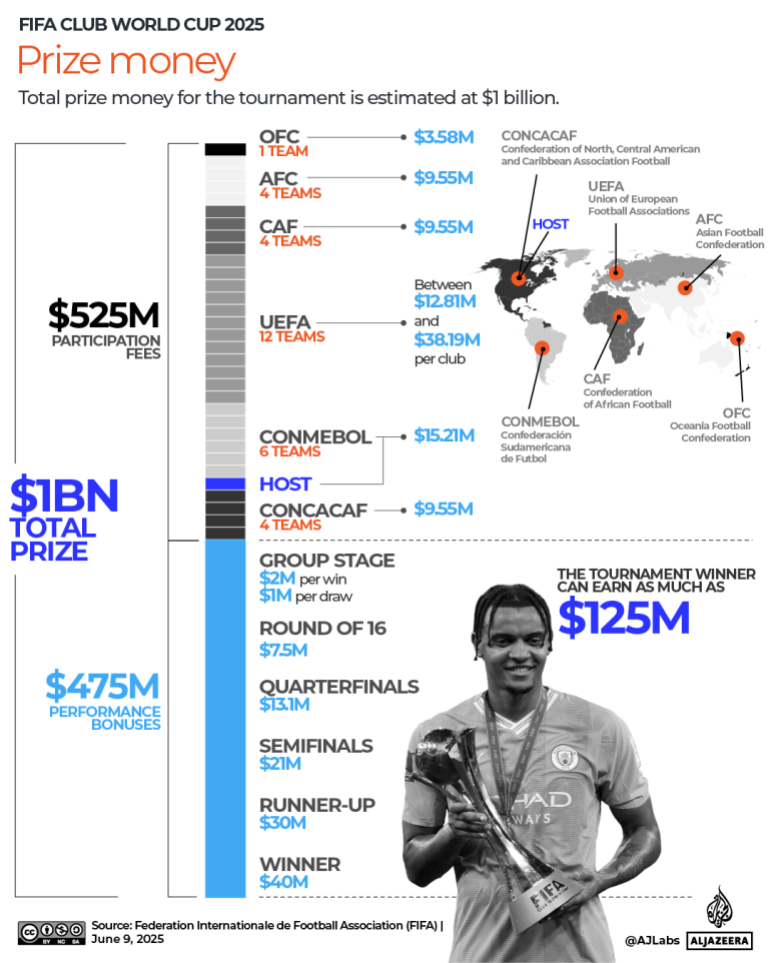
With the FIFA Club World Cup 2025 about to get under way on Saturday, the football league in the host nation United States (US) finds itself at odds with players from its three participating clubs over monetary compensation from the tournament. Three Major League Soccer (MLS) clubs – Inter Miami, Seattle Sounders and Los Angeles FC – are among the 32 teams that have qualified for the tournament running from June 14 to July 13 across 11 venues in the US. Players from the three clubs, represented by the MLS Players Association (MLSA), have protested over the amount of compensation they are promised from the tournament by the MLS. Here’s a breakdown of the ongoing tussle between the MLS and its players: What’s the Club World Cup pay dispute between the MLS and its players? The players are demanding an increased share of the tournament prize money in addition to the participation fee they are set to receive. The players’ association has accused the MLS of refusing to engage in a negotiation so far, while the league has said it has offered the clubs an “enhanced structure” for the players. Advertisement How have the players registered their protest? On June 1, players of Seattle Sounders FC brought attention to the issue by wearing shirts that read “Club World Cup Ca$h Grab” during their warm-up session before their match against Minnesota United FC. A number of players from the three clubs also posted on social media with the hashtag #FairShareNow, causing fans to take notice and engage in social media conversations. #FairShareNow pic.twitter.com/EW7ABFbsPX — Stefan Frei (@Stefan24Frei) June 8, 2025 How much money will MLS clubs receive at the Club World Cup? Every MLS team will earn a participation fee of $9.55m, but can win additional prize money based on its performance. Each win or draw during the tournament will also bring in additional prize money, which can increase further should the club advance to the next stages. Since LAFC beat Club America to qualify for the tournament in a playoff game, they won an additional $250,000 in prize money. What part of the prize money will go to the players? According to the existing collective bargaining agreement (CBA) between the MLS and MLSPA, the players are eligible to receive 50 percent of the prize money in undefined tournaments such as the Club World Cup. The MLS, on Sunday, said it has proposed an enhanced structure for the Club World Cup “to reward both participation and competitive achievement in the tournament.” According to the MLS, this is what’s on offer in the revised proposal: “In addition to the guaranteed $1m per team for qualifying, 20 percent of all prize money earned from the group stage onward would be allocated to players. If an MLS club wins the Club World Cup, its players could collectively receive more than $24m in performance bonuses.” What do the MLS players want? They seek a better deal than the one put forward by the MLS in its latest proposal, and for the league to engage with its players in a negotiation. Advertisement The players’ association says the latest proposal offered by MLS does not include any additional participation bonuses for the players and offered “below-standard” back-end compensation. The MLSPA has also accused the league of asking for unrelated concessions to the CBA. As things stand, the CBA includes a provision that caps the amount of prize money that can go to players at $1m. The MLSPA believes the players are entitled to a bigger share of the funds. “The timing, substance and retaliatory nature of the proposal sends a clear message: MLS does not respect or value players’ efforts with regard to this tournament,” the MLSPA said in a statement on Sunday. It further added that the proposed 20 percent share of the compensation amount is “below international standard”. “Although not surprised, the players and the MLSPA are deeply disappointed by this message,” the MLSPA said. An update on Club World Cup Bonuses. MLS spent most of last week making threats and promising retaliation against the MLSPA and players because Seattle players wore t-shirts that expressed frustration over the league’s refusal to engage about Club World Cup compensation. More… pic.twitter.com/jAz06ASGYw — MLSPA (@MLSPA) June 8, 2025 How has the MLS responded to the players’ demands? Neither side has issued any further statements, but players have continued posting on social media with the #FairShareNow hashtag. Reports in US media said the talks between the two sides were ongoing. The league’s last statement said that MLS owners believe that performance-based incentives are appropriate given the expanded format and increased prize pool for the tournament. Advertisement “The League values the continued dedication and commitment of its players and looks forward to supporting them as they represent their clubs – and Major League Soccer – on the global stage this summer,” it added. What happens if the players and MLS don’t reach an agreement? Should both sides remain at loggerheads, it is unlikely that the players will refuse to take the field for their games in a tournament hosted in their clubs’ home country. If they do, the players risk being fined and reprimanded by the league in accordance with its rules. How does the MLS pay dispute impact the FIFA Club World Cup? It is unlikely to impact the tournament directly unless the players refuse to take the field for their clubs. However, the controversy has added what would be considered unwelcome attention to the MLS’s pay structure and the Club World Cup, a tournament that has already faced plenty of criticism from football players and officials. Why aren’t players from other leagues protesting? It remains unclear how other leagues and teams are compensating their players for their participation in the Club World Cup. The breakdown and distribution of the prize money and participation fee vary across leagues. Adblock test (Why?)
Al Jazeera journalist arrives in Paris after Israel deportation
[unable to retrieve full-text content] Al Jazeera journalist Omar Faiad arrived in Paris after being deported by Israel for being aboard the ‘Madleen’.
Top CFPB enforcement official to resign amid policy shifts under Trump
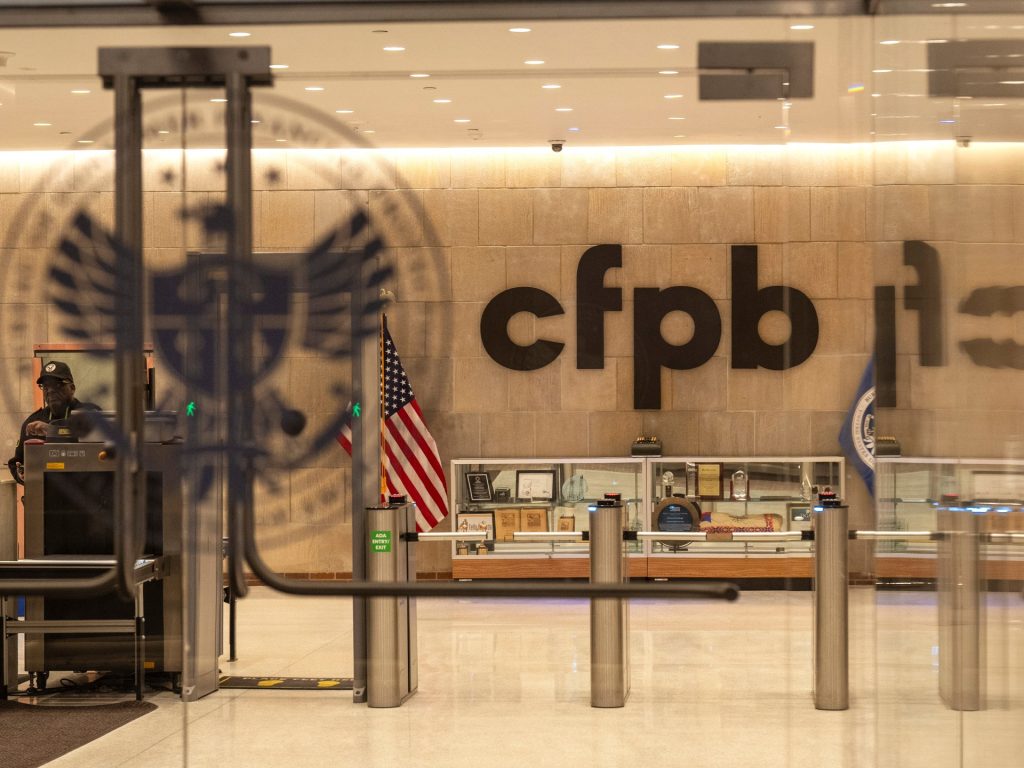
Acting Enforcement Director Cara Petersen has served with the United States agency since it was founded. The top remaining enforcement official at the United States Consumer Financial Protection Bureau (CFPB) has tendered her resignation, saying the White House’s overhaul of the agency has made her position untenable. Acting Enforcement Director Cara Petersen, who has served at the agency since its creation nearly 15 years ago, said that current leadership under US President Donald Trump “has no intention to enforce the law in any meaningful way”, according to an email first obtained by the Reuters news agency. “I have served under every director and acting director in the bureau’s history and never before have I seen the ability to perform our core mission so under attack,” Petersen wrote in an email. “It has been devastating to see the bureau’s enforcement function being dismantled through thoughtless reductions in staff, inexplicable dismissals of cases, and terminations of negotiated settlements that let wrongdoers off the hook.” Petersen’s departure comes four months after the agency’s enforcement and supervision chiefs also resigned amid efforts by President Donald Trump to dismantle the CFPB. Advertisement An agency spokesperson and Petersen did not immediately respond to requests for comment. In addition to seeking to cut the CFPB’s workforce by about 90 percent, acting Director Russell Vought and chief legal officer Mark Paoletta have said they will slash agency enforcement and supervision and have dropped major CFPB enforcement cases en masse, including against Capital One and Walmart. The agency has even revised some cases already settled under the prior administration. The dramatic changes come as Republicans have complained for years that the CFPB, created in the aftermath of the 2007-2009 global financial crisis, is too powerful and lacks oversight. Democrats and agency backers contend it plays a critical role in policing financial markets on behalf of consumers. “While I wish you all the best, I worry for American consumers,” said Petersen in her email. A federal appeals court in Washington has yet to decide on the Trump administration’s effort to undo a court injunction blocking the agency from firing most agency staff. Adblock test (Why?)
10 dead in Austria’s deadliest school attack
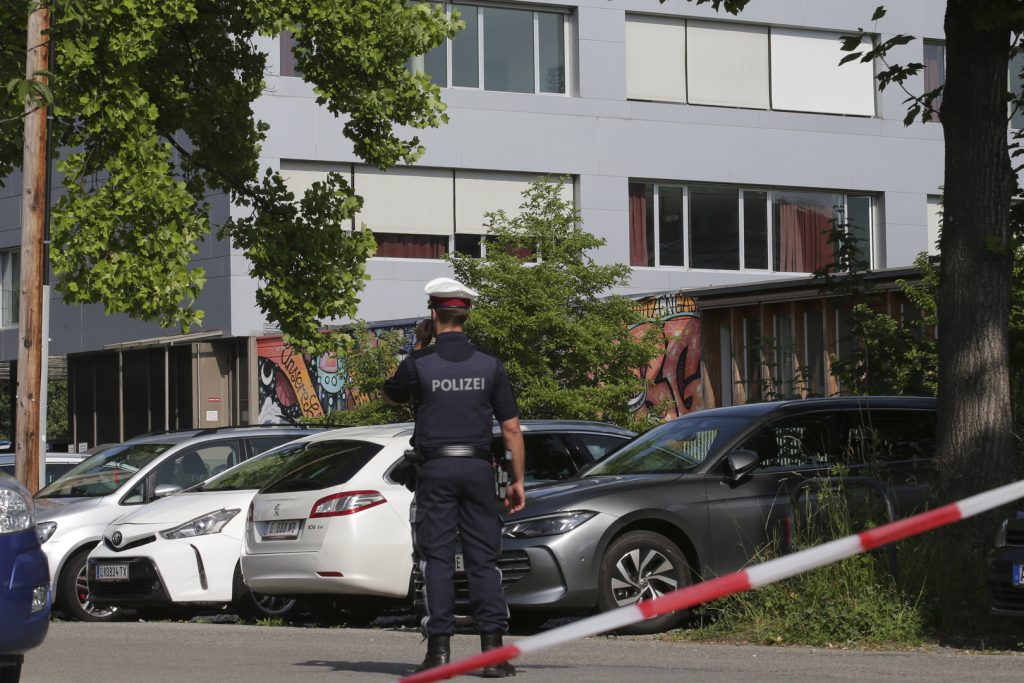
NewsFeed A former student opened fire at a high school in Graz, killing at least nine people in the deadliest shooting in Austria’s modern history. The gunman, who acted alone, died by suicide, officials said. Victims include teens, a teacher, and school staff. Published On 10 Jun 202510 Jun 2025 Adblock test (Why?)
Breaking down the drone ‘revolution’ driven by Russia’s war on Ukraine
[unable to retrieve full-text content] Russia and Ukraine are waging a remotely controlled battle in the air and at sea.
Israeli attack kills three paramedics in Gaza City

NewsFeed Three Palestinian paramedics were killed in an Israeli attack in Gaza City on Monday night, while attempting to rescue injured civilians under the rubble from a previous strike. A journalist who was with them was also killed. Published On 10 Jun 202510 Jun 2025 Adblock test (Why?)
Columbia University deserves to lose its accreditation
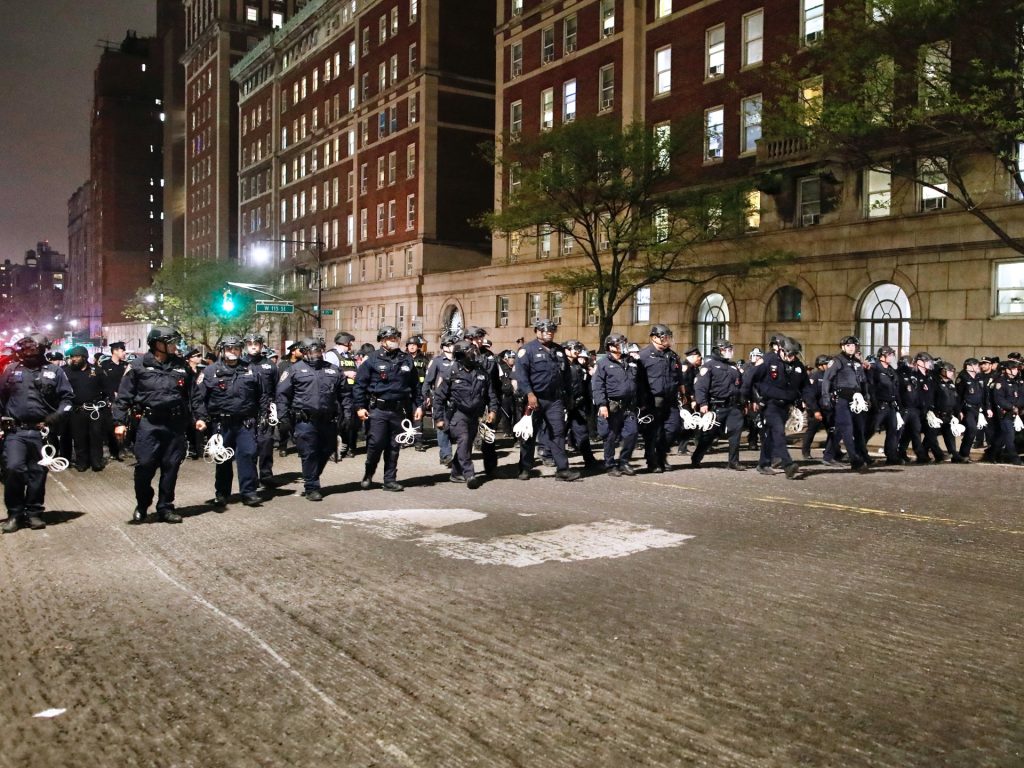
On June 4, the United States Department of Education notified the Middle States Commission on Higher Education (MSCHE) accrediting agency that its member institution Columbia University deserves to have its accreditation pulled. It accused the university of ostensibly being “in violation of federal antidiscrimination laws” for supposedly failing “to meaningfully protect Jewish students against severe and pervasive harassment”. This claim is, of course, wrong. It is a blatant mischaracterisation of the events that have taken place on campus over the last 19 months. Yet, it is also true that during that time Columbia violated the terms of its accreditation: by violently abrogating the academic freedom and viewpoint diversity of antigenocide protesters via institutional sanction and the deployment of police on campus. In this sense, Columbia does deserve to lose its accreditation. MSCHE’s accreditation policy, which is standard across the industry, states that an “accredited institution” must possess and demonstrate both “a commitment to academic freedom, intellectual freedom, freedom of expression” and “a climate that fosters respect among students, faculty, staff, and administration from a range of diverse backgrounds, ideas, and perspectives”. Advertisement It is stunningly evident that since October 7, 2023, Columbia University has egregiously and repeatedly failed to satisfy the MSCHE’s fundamental requirements due to its response to antigenocide protests on campus concerning Gaza and Palestine. The violent removal, suspension, and arrest of peaceful student protesters and faculty critics should be understood to constitute a violation of the institution’s obligation to protect freedom of expression and academic freedom. On November 10, 2023, Columbia suspended Students for Justice in Palestine (SJP) and Jewish Voices for Peace (JVP) after they organised a peaceful protest for Palestinian rights. The administration justified the suspension by claiming the groups used “threatening rhetoric and intimidation”. However, media reports, witnesses and university insiders revealed that the suspension was based on an incident involving an unaffiliated individual whose actions were condemned by the organisers and that no formal disciplinary process or appeals process was allowed by the university. It was later uncovered that Columbia administrators had unilaterally altered language in its official policies on student groups just before suspending the SJP and JVP. In January, Katherine Franke, a tenured law professor, retired and said she was “effectively terminated” by Columbia after facing public and congressional criticism for a media interview criticising students who formerly served in the Israeli army. Similarly, the university has recently acknowledged doling out “multi-year suspensions, temporary degree revocation and expulsions” to dozens of students who participated in 2024 antigenocide protests. One of those expelled, Jewish PhD student Grant Miner, president of the Student Workers of Columbia, noted that all of the students censured by the university “had been cleared of any criminal wrongdoing”. Advertisement Perhaps worst of all, Columbia has, on repeated occasions, invited the New York Police Department (NYPD) onto campus to intervene against student expression. On April 30, 2024, according to the university’s own report, the NYPD arrested 44 students and individuals with apparent associations with the university. Likewise, in early May this year, about 70 students were arrested after participating in an “occupation” of the university’s library. The NYPD explicitly acknowledged that the presence of its officers on campus was “at the direct request of Columbia University”. There is little question each of these incidents constitutes blatant stifling of academic freedom and viewpoint diversity. The disproportionate targeting of Arab, Muslim, Palestinian and Jewish students and allies can be viewed as discriminatory, undermining the institution’s commitment to equitable treatment and inclusive learning environments, in clear violation of MSCHE’s guiding principles on equity, diversity and inclusion. These decisions to suppress protests were made unilaterally by senior administration at Columbia – without input from faculty, students or shared governance bodies – clearly signalling a lack of adherence to MSCHE’s accreditation policy standard on governance, leadership and administration. By failing to show “a commitment to shared governance” with “administrative decision-making that reflects fairness and transparency”, Columbia has failed to meet the standards of accreditation outlined by the MSCHE. Advertisement But Columbia University is not alone in failing to abide by guiding principles of its accreditation. At Muhlenberg College in Pennsylvania, Jewish Associate Professor Maura Finkelstein was summarily fired for engaging in social media critiques of Israel’s genocide in Gaza. Similarly, at Northwestern University, Assistant Professor Steven Thrasher was subjected to multiple investigations in relation to his support of the student antigenocide encampment on campus and was ultimately denied tenure in a decision he characterised as an effort designed to not just silence him but also to bully him so that “students, journalists, faculty, staff and activists across campus and throughout the country [may be intimidated] into silencing themselves”. Students too have faced repression across the United States. Indeed, it has been estimated that by July 2024, at least 3,100 students had been arrested for participation in campus antigenocide protests. On November 6, 2023, Brandeis University became the first private university in the US to ban its student chapter of the SJP, for “conduct that supports Hamas”. In April 2024, Cornell University suspended several students involved in pro-Palestinian encampment protests, citing violations of campus policies. Then in May, police brutalised students with pepper spray at George Washington University while arresting 33 people in the violent clearing-out of its student encampment. At Vanderbilt University, students were arrested and expelled for occupying an administration building. Advertisement In the most recent news, it has become clear that the University of Michigan has spent at least $800,000 hiring dozens of private investigators to surveil antigenocide student protesters on and off campus in Ann Arbor. These examples are merely a small sample of what has occurred across the US, Canada and Europe since long before October 7, 2023. This is a broader existential crisis in higher education in which the free expression of students is being suppressed at the cost of the values these universities purport to espouse. Despite appearances, this crisis has very little to do with the heavy-handed Trump administration. It is, rather, the self-inflicted consequence of
What’s next in US President Donald Trump’s immigration crackdown?
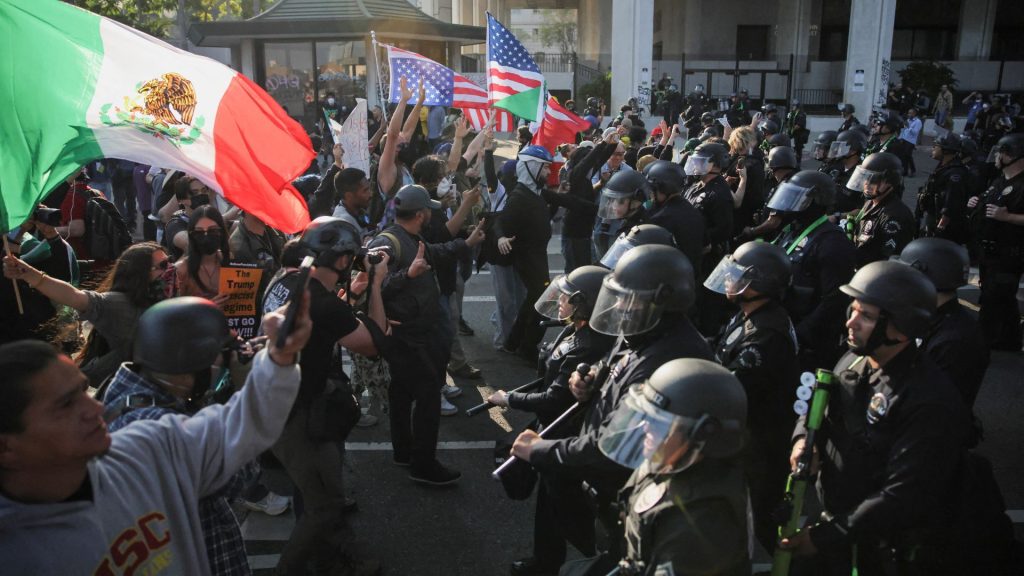
The deployment of soldiers on the streets of Los Angeles brings crisis to new level. National Guard soldiers and even the United States Marines are on the streets of Los Angeles. They were deployed by President Donald Trump after mass protests against his immigration raids. California’s governor is suing him – while the protests spread to other cities. Could this crisis worsen? Presenter: Folly Bah Thibault Guests: Peter Eliasberg – chief counsel at the American Civil Liberties Union of Southern California Claire Finkelstein – professor of law at the University of Pennsylvania Mark Pfeifle – Republican strategist, founder and president of Off the Record Strategies Adblock test (Why?)
‘It’s so painful’: Man City’s Guardiola speaks up on Israel’s war on Gaza
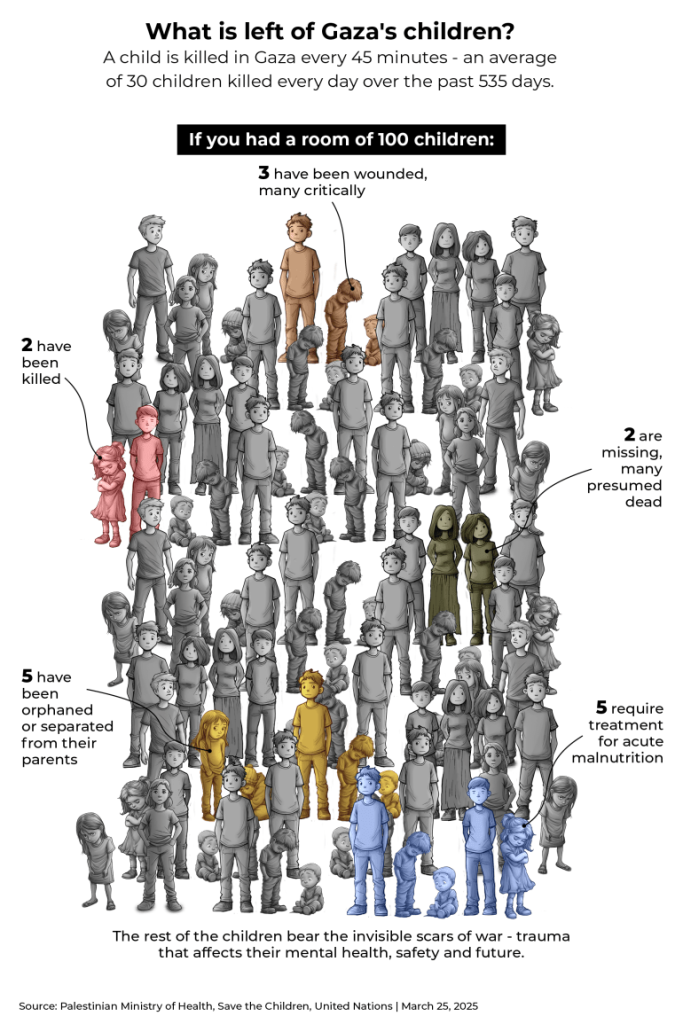
Manchester City manager Pep Guardiola says the images of children being killed during Israel’s war on Gaza are “painful” and have left him “deeply troubled”. The Spanish manager of the English Premier League club urged the world to speak up instead of choosing to stay silent “in the face of injustice” as he addressed an audience after receiving an honorary degree at the University of Manchester on Monday. “It’s so painful what we see in Gaza. It hurts all my body,” Guardiola said. “Maybe we think that when we see four-year-old boys and girls being killed by bombs or being killed at a hospital, which is not a hospital any more, it’s not our business. Yeah, fine, it’s not our business. But be careful – the next four- or five-year-old kids will be ours.” Mentioning his three children – Maria, Marius and Valentina – Guardiola said that every morning “since the nightmare started” in Gaza, whenever he sees his two daughters and son he is reminded of the children in Gaza, which leaves him feeling “so scared”. About half of Gaza’s 2.3 million residents are children. Since October 7, 2023, Israel has killed at least 17,400 children, including 15,600 who have been identified, according to the Ministry of Health in Gaza. Many more remain buried under the rubble and are presumed dead. Advertisement Many of the surviving children have endured the trauma of multiple wars, and all of them have spent their lives under an oppressive Israeli blockade. Over the past 20 months, Israeli attacks have left their homes in ruins, destroyed their schools, and overwhelmed their healthcare facilities. (Al Jazeera) ‘Deeply troubled’ by wars During his emotional speech, which has been widely shared on social media, Guardiola said the world remains silent in the face of injustice. “We feel safer [staying silent] than speaking up,” he added. “Maybe this image feels far away from where we are living now, and you might ask what we can do,” he added. He then went on to narrate the story of a bird trying to put out a fire in a forest by repeatedly carrying water in its beak. “In a world that often tells us we are too small to make a difference, that story reminds me the power of one is not about the scale – it’s about choice, about showing up, about refusing to be silent or still when it matters the most.” The former Barcelona coach and player said the images out of Palestine, Sudan and Ukraine left him “deeply troubled”. Guardiola, who has formerly voiced his support for the independence of his native Catalonia, lashed out at world leaders for their inability to stop the wars. “We see the horrors of thousands and thousands of innocent children, mothers and fathers. “Entire families suffering, starving and being killed and yet we are surrounded by leaderships in many fields, not just politicians, who don’t consider the inequality and injustice.” Advertisement An independent United Nations commission report released on Tuesday accused Israel of committing the crime against humanity of “extermination” by attacking Palestinian civilians sheltering in schools and religious sites in Gaza. “While the destruction of cultural property, including educational facilities, was not in itself a genocidal act, evidence of such conduct may nevertheless infer genocidal intent to destroy a protected group,” the report said. While the report focused on the impact on Gaza, the commission also reported significant consequences for the Palestinian education system in the occupied West Bank and East Jerusalem as a result of ramped-up Israeli military activity, harassment of students and settler attacks. “Children in Gaza have lost their childhood. With no education available, they are forced to worry about survival amid attacks, uncertainty, starvation and subhuman living conditions,” the report added. “What is particularly disturbing is the widespread nature of the targeting of educational facilities, which has extended well beyond Gaza, impacting all Palestinian children.” “It’s so painful, what we see in Gaza … And let me be clear, this is not about ideology.” Manchester City manager Pep Guardiola discusses his views on Israel’s war on Gaza, as well as how the images of children living through the war have affected him as a parent. pic.twitter.com/zwrlexAcxa — Al Jazeera English (@AJEnglish) June 10, 2025 Adblock test (Why?)
Japan beat Indonesia 6-0 in final AFC World Cup Group C qualifier
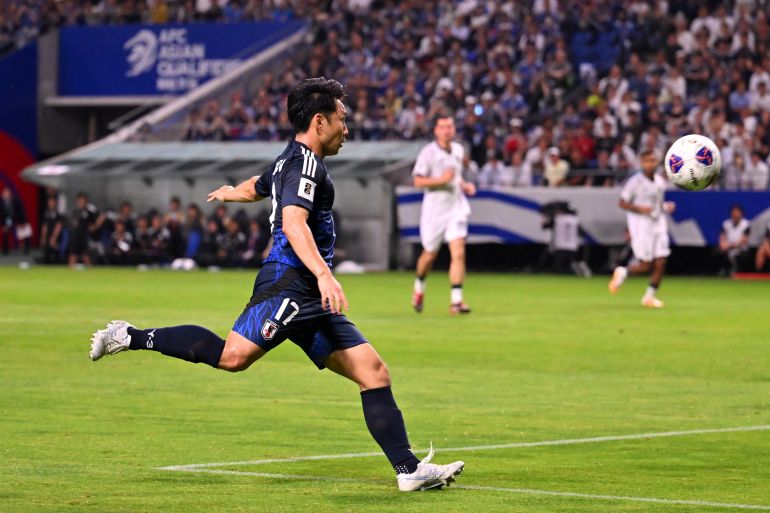
Already qualified Japan beat Indonesia 6-0 in the final Group C game in the AFC qualifiers for the 2026 FIFA World Cup. Daichi Kamada scored twice as Japan rounded off their successful World Cup qualifying campaign with a 6-0 thrashing of Patrick Kluivert’s Indonesia in Osaka. Kamada, an FA Cup winner with Crystal Palace in England this season, struck twice in Tuesday’s first half as already-qualified Japan finished their campaign as Group C winners, scoring 30 goals in their 10 matches. Takefusa Kubo, Ryoya Morishita, Shuto Machino and substitute Mao Hosoya were also on target against Indonesia, who finished fourth in the group. Kluivert’s side, who were backed by a large number of supporters who had travelled to Japan, advanced to a further round with five other teams to decide two more Asian qualifiers for next year’s tournament in the United States, Canada and Mexico. The result matched Japan’s previous winning margin against Indonesia, which also came in a 6-0 win in 1976. Morishita scored one of six goals in Japan’s shutout of Indonesia [Kenta Harada/Getty Images] Japan coach Hajime Moriyasu has set the ambitious target of winning the World Cup in North America. Advertisement His side will play friendlies against teams from outside Asia over the next 12 months, and Kamada is looking to learn from the experience. “Playing against Asian teams and against the kind of European teams who will be at the World Cup is totally different,” said the 28-year-old. “As we play these games, we will start to see a lot of areas where we need to improve. We need to come together as a team and overcome these problems when they crop up.” Japan have already lined up away friendlies against Mexico and the US in September and will face four as yet unnamed opponents at home before the end of the year. Moriyasu said his players need to keep improving “in all departments” and praised their attitude against Indonesia. “The challenge for the players is to break past their limits and grow,” he said. “They did that in training and in the game, where they were never satisfied and always looking for the next goal and the next chance, which is great to see.” Japan coach Hajime Moriyasu, left, oversaw seven wins in the 10 matches of Group C of the AFC World Cup qualifiers [Issei Kato/Reuters] Japan lost their unbeaten qualifying record in a 1-0 defeat away to Australia last week, with coach Hajime Moriyasu fielding an experimental lineup with qualification already in the bag. He started with two more debutants against Indonesia, handing first caps to defender Junnosuke Suzuki and winger Shunsuke Mito. Kamada opened the scoring in the 15th minute, heading home from a Mito cross. The Palace forward turned provider for his team’s second, combining with Kubo before the Real Sociedad man fired past Indonesia goalkeeper Emil Audero. Morishita celebrates scoring Japan’s fourth goal with his teammates [Issei Kato/Reuters] Indonesia lost defender Kevin Diks to injury midway through the first half, and his replacement, Yakob Sayuri, lasted only 15 minutes before he also had to go off after a clash of heads. Advertisement Kamada scored Japan’s third on the stroke of half-time, waltzing through the Indonesia defence before tucking the ball over Audero. Morishita volleyed home at the back post in the 55th minute for his first international goal. Machino and Hosoya also got on the scoresheet as Japan continued to squeeze Indonesia until the final whistle. Adblock test (Why?)

